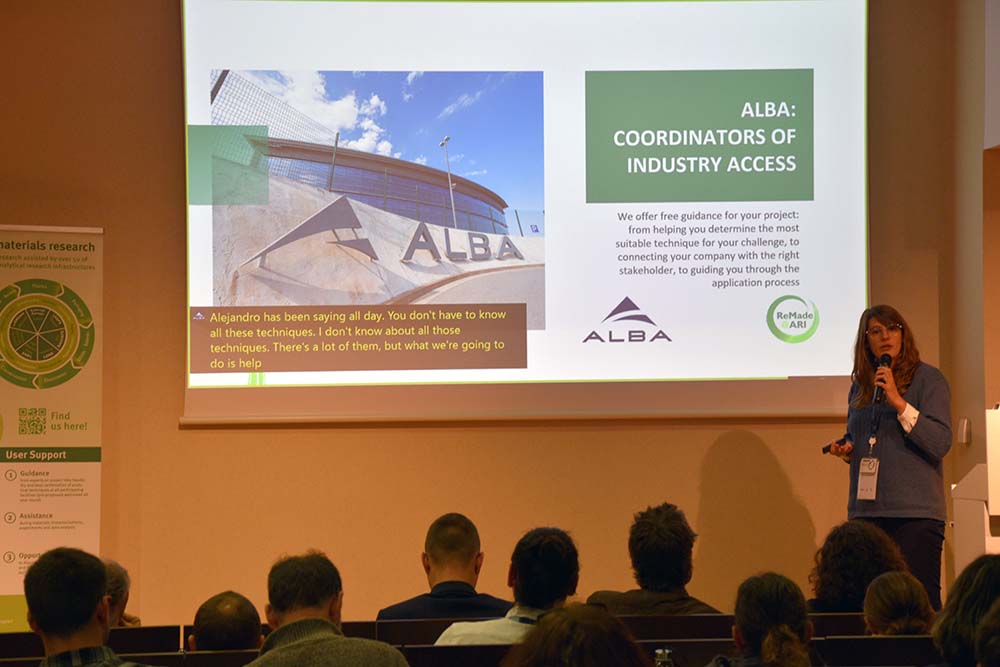ALBA Synchrotron

Companies and research centers in the battery sector gathered at ALBA to promote innovation in battery manufacturing and recycling. The event was attended by 76 participants and representatives from 23 companies, with over 100 B2B meetings facilitating networking and collaboration among the attendees.
The ALBA Synchrotron, in collaboration with the cluster secpho and funded by the European project ReMade@ARI, hosted an event dedicated to battery manufacturing and recycling on April 26. The event, which attracted 76 participants and representatives from 23 companies, facilitated over 100 B2B meetings, establishing itself as a crucial meeting point for the circular battery industry in Spain and Europe.
The event began with a welcome from the Scientific Director of ALBA, Klaus Attenkofer, who highlighted ALBA's commitment to hosting such events and closely collaborating with companies in the battery sector to address current challenges in energy and the circular economy, where batteries play a crucial role. Following this, Alejandro Sánchez, Director of the Industrial Office of ALBA, gave a talk explaining what the ALBA Synchrotron is and showed several examples of its unique applications in various industrial sectors.
Then, Elisabeth Torralba, Member Success Manager of the secpho cluster, detailed the development of the event and its objectives. The event was divided into three sessions, with increasing TRL levels, dedicated to the applications of the synchrotron in the circular battery industry, the characterization of battery materials using synchrotron light, and the characterization of batteries using other techniques. After these sessions, there was a presentation exclusively focused on showcasing the funding opportunities offered by ReMade@ARI to access large scientific facilities.
In the first session, Alexander Missyul, a researcher at the MSPD beamline of ALBA, demonstrated in a very educational way the applications of X-ray diffraction to the battery industry. Rosa Palacín, research professor at ICMAB-CSIC, explained several very illustrative examples of industrially relevant experiments in the field of batteries with synchrotron radiation.
After the coffee break, the second session of talks began, started by Joseba Oribe, a researcher at CIC energiGUNE, who explained the techniques for characterizing electrode materials for lithium and sodium-ion batteries based on synchrotron X-rays. Subsequently, Laura Simonelli, a researcher at the CLÆSS beamline of ALBA, delved into the topic, showing how the combination of synchrotron techniques can improve the performance and recycling of batteries. This session concluded with a talk by Philipp Kurzhals, Project Manager in the "Global Process R&D Battery Materials" department at BASF, who presented several examples of cathode material characterization performed at a large company like BASF.
The final session of talks featured prominent companies such as EXOM, Coherent Inc, Hamamatsu Photonics, bcb and TerrePower Europe. Juan Isaza from EXOM showed some opto-mechanical solutions for laser processes in battery manufacturing. Mikel Bengoa from Coherent presented laser applications in battery manufacturing. Jordi Sobrino from Hamamatsu Photonics demonstrated how their products can perform non-destructive inline inspections of lithium-ion batteries. Javier Bezares from bcb explained how to detect hot spots and gases to monitor batteries using thermography. Finally, Jesús Toucedo from TerrePower discussed the remanufacturing of batteries to give them a second life before recycling.
Next, Virginia Boix from the Industrial Office of the ALBA Synchrotron presented the different funding opportunities, primarily through the ReMade@ARI project, for companies to use ALBA's services.
The networking lunch fostered close interaction among the attendees, who subsequently had the opportunity to see firsthand the inner workings of ALBA, its functioning, and some other applications through a guided tour of the facilities conducted by members of the ALBA Industrial Office.
Finally, two hours were dedicated to B2B meetings, generating over 100 encounters among the attendees, fostering numerous connections and opportunities to share ideas. This conclusion was a great success for an event that could be the start of many collaborations driving technological innovation in the battery industry.
The event not only provided a platform for the dissemination of scientific and technical knowledge but also facilitated the creation of networks and collaborations through numerous B2B meetings. Attendees valued the opportunity to interact directly with industry leaders and academics, promising to drive new initiatives and joint projects in the field of batteries and the circular economy.
See the full agenda at this link
Know more about the Industrial Office

Funded by the European Union as part of the Horizon Europe call HORIZON-INFRA-2021-SERV-01 under grant agreement number 101058414 and co-funded by UK Research and Innovation (UKRI) under the UK government’s Horizon Europe funding guarantee (grant number 10039728) and by the Swiss State Secretariat for Education, Research and Innovation (SERI) under contract number 22.00187.